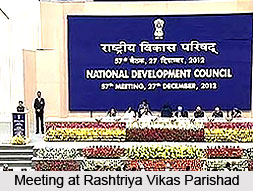 National Development Council (NDC) or Rashtriya Vikas Parishad came into being on August 6th 1952. Since the very beginning, there was felt a need for the creation of a body consisting of the representatives of the Central Government, the constituent units of a federal union and others equally interested and qualified for the job. In fact, the draft outline of the very first five-year plan (July 1951) had expressed the need for such a body. This proposal was accepted by the Government of India and thus the National Development Council was created. The main intent behind setting up this body was to strengthen and mobilise the efforts and resources of the nation in support of the Five Year Plans, to promote common economic policies in all vital spheres and to ensure the balanced and rapid development of all parts of the country. It is an extra-constitutional and non-statutory body and acts as an advisory body to Planning Commission of India
National Development Council (NDC) or Rashtriya Vikas Parishad came into being on August 6th 1952. Since the very beginning, there was felt a need for the creation of a body consisting of the representatives of the Central Government, the constituent units of a federal union and others equally interested and qualified for the job. In fact, the draft outline of the very first five-year plan (July 1951) had expressed the need for such a body. This proposal was accepted by the Government of India and thus the National Development Council was created. The main intent behind setting up this body was to strengthen and mobilise the efforts and resources of the nation in support of the Five Year Plans, to promote common economic policies in all vital spheres and to ensure the balanced and rapid development of all parts of the country. It is an extra-constitutional and non-statutory body and acts as an advisory body to Planning Commission of India
Composition of National Development Council
The Council comprises the Indian Prime Minister, all the Union Cabinet Ministers, Chief Ministers of all States or their substitutes, representatives of the union territories and the members of the Commissions. There have been occasions when the Reserve Bank Governor and other experts have been invited to address the meetings. The large membership of the Council, which at one time rose to 50, reduced the utility of the Council for discussion as a compact body and in November 1954 a Standing Committee was established with only nine Chief Ministers and a few Union Ministers as members. In addition, the Council has been appointing committees from time to time for a detailed examination of certain problems. The Prime Minister is the Chairman of the Council and the Secretary to the Commission acts as its Secretary and the Commission furnishes the Council with administrative and other assistance. The Council ordinarily meets twice a year. It is interesting to note that the Council ordinarily passes no resolution formally. The practice is to have a complete record of discussion and gather out of it general trends pinpointing particular conclusions. Decisions are usually unanimous.
Functions of National Development Council
In October 1967, on the recommendations of the Administrative Reforms Commission, the Council was reconstituted and its functions were redefined to include:
1) Prescription of guidelines for the formulation of National Plan, including the assessment of resources for the Plan
2) Consideration of national Plan as formulated by the National Development Council;
3) Considering important questions of social and economic policy affecting national development; and
4) The review of the working of the Plan from time to time and recommending such measures as are necessary for achieving the aims and targets to secure the active participation and cooperation of the people, improving the efficiency of the administrative services, ensuring the fullest development of the less advanced regions and sections of the community and, through sacrifice, borne equally, by all citizens, build up resources for national development.
It was envisaged that the National Development Council would advise and make its recommendations to the Central and State Governments. Since its inception, it has been functioning as a high power consultative body where the frame of the Five Year Plans, the important problems facing the Indian economy, and the policies, that have to be adopted for tiding over the urgent problems have been discussed and solutions arrived at. Thus in addition to the Plan, the Council has concerned itself with problems like food, creation of the State Trading Corporation and land reforms.
The prime function of the Council is to act as a kind of bridge between the Union Government, the Planning Commission and the State Governments. It helps in the coordination not only of policies and programmes of plans but also other matters of national importance. It provides a good forum for discussion and full and free exchange of views. There is no other comparative forum. It is also a device for sharing of responsibility between States and the Union Government.




















